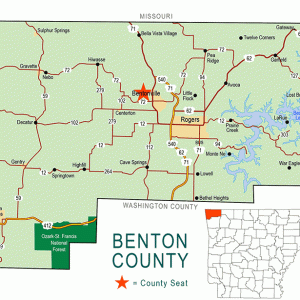calsfoundation@cals.org
Prairie Creek (Benton County)
Prairie Creek in Benton County began in the White River valley area as a small farming community made up of about three families. The creation of Beaver Lake in the 1960s transformed the region into a center of tourism. Now, it is a planned community development and is home to a number of retirees.
Prairie Creek was established as a township in April 1859 through the efforts of John B. Putnam and fifty other citizens of the surrounding areas, including Sugar Creek, White River, and Big Spring. The township was created with land taken from these other townships. A three-mile stream fed by various other streams along the way ran through the area.
This area continued as a small farming community until the creation of Beaver Lake. The farmers of this region mainly grew oats, corn, hay, beans, tomatoes, and other vegetables. Some farms had dairy and beef cattle. The land had been used almost exclusively as forest or pastureland before the flooding of the lake. The land that was not acquired for the lake has developed into residential and recreational property, and a smaller portion has developed into commercial property. Children in Prairie Creek attended a one-room schoolhouse at Cloverdale (Benton County), a few miles southeast of the Prairie Creek area. By the late 1940s, Prairie Creek children attended school in Rogers (Benton County).
The acquisition of land to create Beaver Lake began in 1958 by the U.S Army Corps of Engineers. The creation of Beaver Lake was to help control the flooding of the White River in that area, and the lake also offered potential for hydroelectric power and a fresh water supply. Over 40,000 acres were purchased for the building of the Beaver Lake and Dam, which were officially completed in 1966.
Given the community’s close proximity to both the lake and the surrounding cities of Rogers, Bentonville (Benton County), Springdale (Washington County), and Fayetteville (Washington County), it had great potential as a recreation center. Darrow Garner, a land developer who owned some of the prime land near the lake, along with several other land owners in the region, created the Prairie Creek Development Company with the idea of creating residential and commercial property in Prairie Creek. Before the lake had even begun to fill up, contracts had been signed among the landowners to begin the building process. In 1968, when the lake was finally filled, the development in the area was already well under way. The area has no industries but mainly small private businesses, mostly in connection with the lake. Several lodges and private homes can be rented in Prairie Creek. These are close to the Prairie Creek Marina, which provides lake access and recreational opportunities. The Prairie Creek Country Club has one of the best-rated golf courses in Arkansas. The Prairie Creek Association, for those who are residents or own property in this area, supports and informs the residents of Prairie Creek in order to advance and improve development, environmental well-being, property value, and the general welfare of the community. Prairie Creek also has two active churches, the Prairie Creek Assembly of God and Lakeside Baptist Church.
The Prairie Creek Park and marina is one of the area’s leading attractions and covers 179 acres of land, including thirty-two miles of shoreline. Prairie Creek is a main hub for fishing tournaments, which bring many people to the area. The lake provides water to all of Prairie Creek, Rogers, Bentonville, Springdale, Fayetteville, and small surrounding communities. In 2010, the population of Prairie Creek, which is not incorporated, was 2,066.
For additional information:
Black, J. Dickson. History of Benton County. Little Rock: International Graphics Industries, 1975.
Louks, Becky. “Landuse Changes That Have Occurred on the Prairie Creek Arm of Beaver Reservoir as a Result of Impoundment of That Reservoir: 1964–1982.” Unpublished paper, 1983. Rogers Historical Society Research Library. Rogers Historical Museum, Rogers, Arkansas.
Rebekah O. McMillan
Ouachita Baptist University





Comments
No comments on this entry yet.